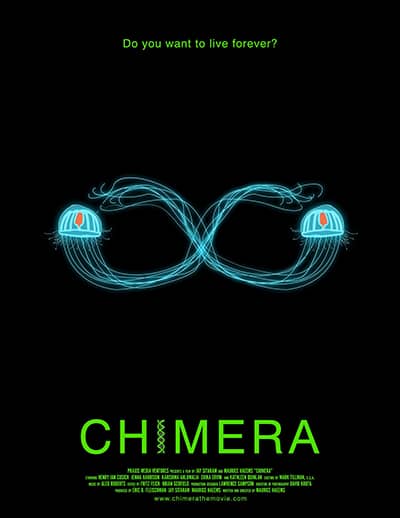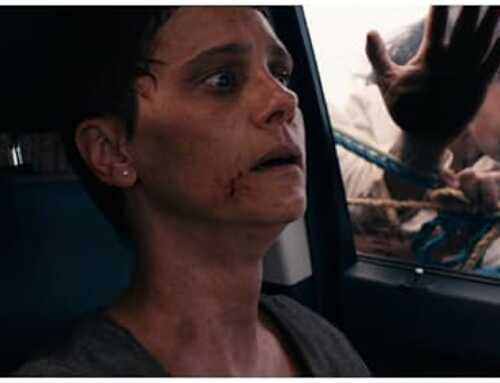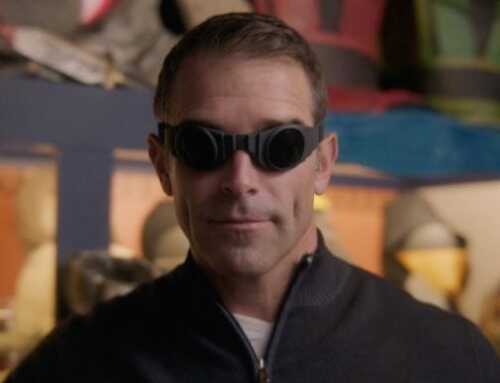 A brilliant but disturbed scientist freezes his children alive, while he races to cure their deadly genetic disease by decoding the DNA of the immortal Turritopsis jellyfish.
A brilliant but disturbed scientist freezes his children alive, while he races to cure their deadly genetic disease by decoding the DNA of the immortal Turritopsis jellyfish.
Who wants to live forever? Man’s struggle to overcome death and disease is a mainstay ofspeculative fiction, forcing us to confront our fragility and wrestle with how our impermanence defines who we are as a species. Chimera, written and directed by Maurice Haeems, is but the latest in a long line of sci-fi films to explore the foggy morality of our efforts to cast off the burdens of death through genetic engineering, exploring what motivates these endeavors and whether immortality is really all it’s cracked up to be.
The film follows Quint (Henry Ian Cusick), a brilliant scientist with a formerly lucrative career as a genetics researcher who has been driven into isolation as he works tirelessly to find a cure for a degenerative disease that has left his wife (Karishma Ahluwalia) on life support and his kids, Miles (Raviv Haeems) and Flora (Kaavya Jayaram), facing the same fate. This leaves Cusick to carry the bulk of the film on his shoulders and while his desperate race against the clock raises the stakes and keep the viewer wondering if he can manage to put the pieces together in time, the character’s single-minded obsession with his work, combined with the lack of strong supporting characters makes the film at times frustrating, as it chases its tail over the same few plot points with little in the way of character development. Efforts are made to humanize and flesh out Quint’s character in his interactions with his kids and his wife who manifests as a hallucination, questioning Quint’s motives at every turn as her physical form withers away. These interactions tend toward the overly dramatic, as she berates him for his efforts, suggesting that to correct his kids’ conditions is to rob them of their humanity and that children are being killed to supply him the stem cells he needs to continue his research, a charge he responds to in a maniacal, Dr. Frankenstein-esque fashion, arguing that his work will allow them to transcend their humanity.
These interactions work to try and prop up Quint’s philosophical dilemma, but the theatrics and somewhat pedestrian nature of his research make it all seem a bit forced. Embryonic stem cell research is a controversial matter to be sure, but research continues to take place in this field and the subject has by and large faded from public consciousness as a source of debate. Chimera, however, treats stem cells as if they were some sort of highly toxic nerve agent, something that is dangerous and nearly impossible to acquire. Granted, the film takes place several decades in the future (though this is never explicitly stated in my recollection and recognizable items like cars appear entirely modern) and it is suggested that this sort of research has become increasingly restricted, but the dire moral implications that the film tries to present failed to resonate with me. Beyond his struggles with his own self-doubt, Quint also has to contend with his antagonistic relationship with his former employer, Masterson (Kathleen Quinlan), a hard-assed villainess that looks plucked from Grey Gardens, swaggering about with her cigarette in hand and conducting herself with the embittered cruelty of a boozed-up Joan Crawford. She, along with her bodyguard, Dita (Erika Ervin), who makes for an imposing figure with her 6’ 8’’ frame and some iconic costuming choices, butt heads with Quint as Masterson seeks to use Quint’s research to her own ends in curing her husband’s unnamed ailment. Unfortunately, this plotline also fails to be particularly impactful as the audience is given very little insight into the relationship between Masterson and Quint or between Masterson and her husband.
There is just a general lack of exposition in the film, and while that does have the effect of making the experience feel more authentic, it also stunts the ability to connect to the characters and appreciate what has brought them to this place. Certain plot elements are filled in by whispers heard throughout the film from both Quint’s wife and kids that talk about a variety of subjects from the science of eliminating aging and disease to the hopes and dreams of his children, but the fact that they’re essentially just dubbed over while the plot is happening make them something of a distraction that can be hard to follow and often feel like superfluous bits of random science with little direct bearing on the plot.
For being the driving force behind his ambitions, very little time is given to developing Quint’s relationship with his kids. They only appear occasionally and I can only recall a single interaction lasting more than a minute between Quint and his daughter and less with the son. If not for a couple of montages, including a rather strange one where he dresses the kids up as astronauts and they jump around on bungee cords as the screen cuts to images of galaxies and other celestial bodies for some unknown reason, and one scene where he asks the kids if they want pancakes, I would assume the kids just languish in the lab feasting on trapped rats. No indication is given of them going to school, having friends, or even having any access to entertainment or communication with the outside world. This compounds the difficulty in sympathizing with Quint and his plight as he comes off as criminally neglectful toward the same kids that he is trying to save, a fact the film addresses but never resolves in a satisfying way, relegating any bonding to montages that seem to exist to counteract the negative impressions the bulk of the narrative creates. The child actors themselves are the son of the director and the daughter of one of the film’s producers and this is the time where I have to be mean to children because I’m a terrible person. It’s not that it’s awful, it’s just readily apparent in many scenes that they’re delivering lines off a script and they don’t come off as if they’re actually living in this world. For first-time child actors, I’ve seen much worse, but there is only so much that can reasonably be expected of them. The final character in the film is Charlie (Jenna Harrison), a former co-worker of Quint’s that seems to have been romantically involved with him at some point, but as with the rest of the background details, we aren’t given much to go on regarding that. Regardless, they don’t have any particular chemistry but are still forced together in the film’s rushed climax in a desperate attempt to squeeze in some character development.
Visually the film is something of a mixed bag. There is some good effects work, with large, grungy, almost cyberpunk set pieces and a very deliberate usage of color, but good god will this film overwhelm you with blue/orange contrast. It looks good, don’t get me wrong, and that’s why it is so ubiquitous in so many films, but in nearly every scene in this film there is blue/orange contrast being shoved in your face so forcefully that I’m convinced those colors were burned into my retinas after the credits rolled. The camera work is very kinetic with an almost handheld quality in a lot of scenes, but this can be a bit jarring as it adds a rough, almost voyeuristic found footage quality to a film that is otherwise very sharp and modern. Some of the cuts are also unnecessarily quick, jumping from interior to exterior shots so fast that it can be somewhat disorienting. Overall, Chimera has a very sleek and polished aesthetic, especially given its indie budget, but some of the stylistic choices are a bit distracting.
I wouldn’t say I particularly enjoyed Chimera. It’s not incompetently made and features some decent performances, but the narrative seems like it gets caught up on rehashing the same few ideas over and over and none of the character dynamics are compelling enough to make spending the time with these characters particularly satisfying. The underlying concept is interesting and the troubled, morally-ambiguous scientist character is one that certainly had potential, but without a supporting cast to play off of and without developing that familial bond that is supposed to be so central to what motivates our protagonist, this one will not so much make you ponder the nature of life’s impermanence as it will make you wish you had that 80 minutes of your life back.
| Chimera | ||
| RATING: | R | Chimera Trailer |
| Runtime: | 1hr. 20Mins. | |
| Directed By: | ||
| Written By: | ||







